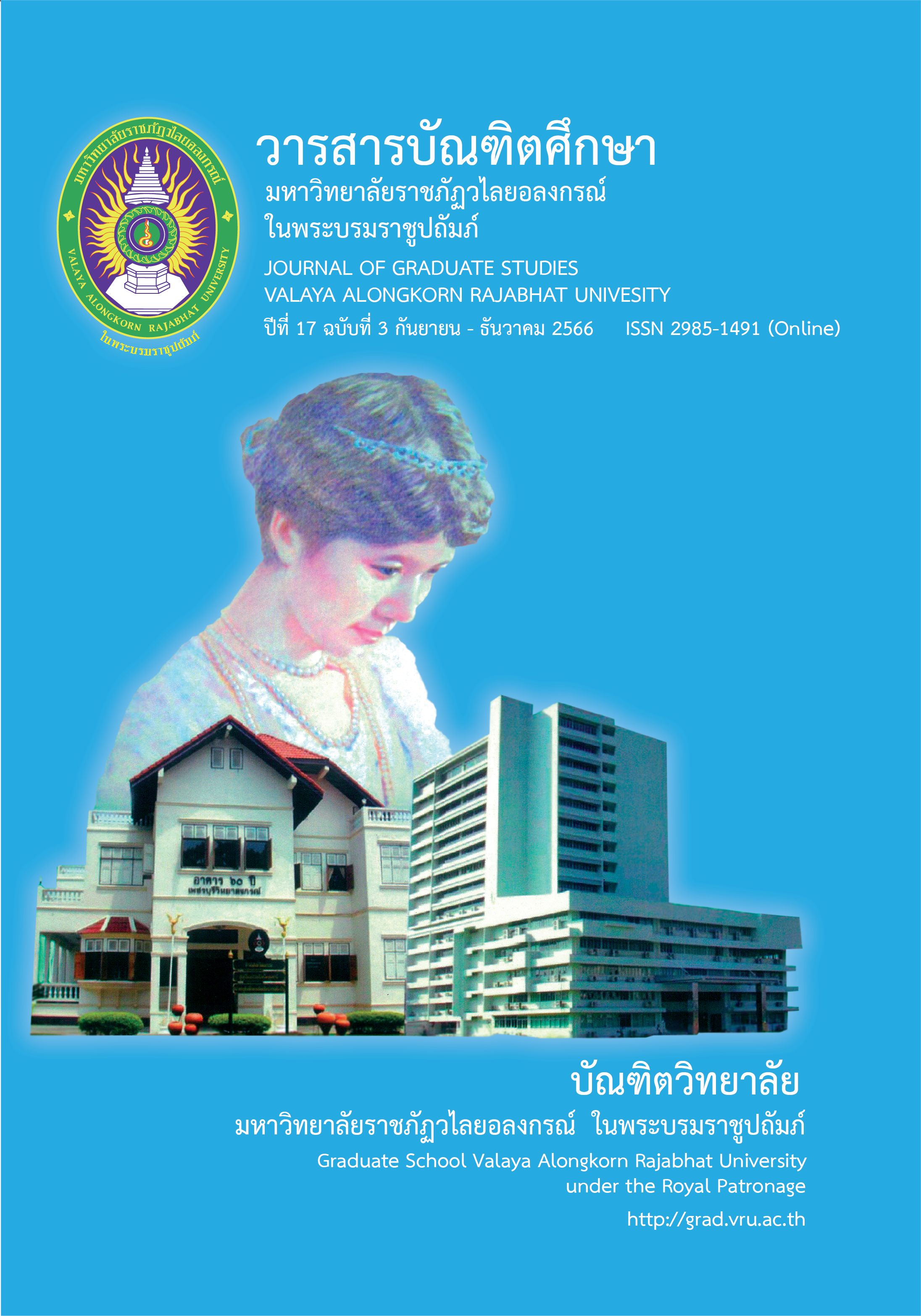IN-SERVICE TEACHER PROFESSIONAL DEVELOPMENT MODEL FOR REINFORCING COMPETENCES IN ORGANIZING SCIENCE EXPERIENCES FOR PRESCHOOLERS
Main Article Content
Abstract
The purposes of this research were to 1) create the in-service teacher professional development model based on Teacher Inquiry and Knowledge-Building Cycle and Explicit Reflective Approach to reinforce competences in organizing science experiences for preschoolers, and 2) examine the quality of the model. The research was carried out in 2 phases of research and development methodology which were phase 1: developing the initial model and phase 2: the pilot study. Participants were 5 experts and 9 preschool teachers of schools under the Private Education Commission. The data were analyzed by content validity with IOC, reliability, and descriptive analysis.
The research results found that: 1) The model consisted of 5 components: principles, objectives, content, process, and evaluation; the handbook of the model consisted of 3 parts: details of the model components, action plans, and model’s evaluation tools. And 2) the model was appropriate, feasible, and consistent with the needs of teachers in real context (IOC = 1.00) and the handbook was highly appropriate for implementation ( = 2.97).
Article Details

This work is licensed under a Creative Commons Attribution-NonCommercial-NoDerivatives 4.0 International License.
บทความทุกเรื่องได้รับการตรวจความถูกต้องทางวิชาการโดยผู้ทรงคุณวุฒิ ทรรศนะและข้อคิดเห็นในบทความ Journal of Global of Perspectives in Humanities and Social Sciences (J-GPHSS) มิใช่เป็นทรรศนะและความคิดของผู้จัดทำจึงมิใช่ความรับผิดชอบของบัณฑิตวิทยาลัย มหาวิทยาลัยราชภัฏวไลยอลงกรณ์ ในพระบรมราชูปถัมภ์ กองบรรณาธิการไม่สงวนสิทธิ์การคัดลอก แต่ให้อ้างอิงแหล่งที่มา
References
Abd-El-Khalick, F. & Akerson, V. L. (2009). The Influence of Metacognitive Training on Preservice Elementary Teachers’ Conceptions of Nature of Science. International Journal of Science Education. 31(16), 2161–2184.
Abd-El-Khalick, F. & Lederman, N. G. (2010). Improving science teachers' conceptions of nature of science: A critical review of the literature. International Journal of Science Education. 22(7), 665-701. Retrieved from https://doi.org/10.1080/09500690050044044
Akerson, V. L., Hanson, D. L. & Cullen, T. A. (2007). The Influence of Guided Inquiry and Explicit Instruction on K–6 Teachers’ Views of Nature of Science. Journal of Science Teacher Education. 18(2007), 751-772.
Anders, Y., Hardy, I., Pauen, S., Ramseger, J., Sodian, B. & Steffensky, M. (2018). Early Science Education – Goals and Process-Related Quality Criteria for Science Teaching. Germany: Verlag Barbara Budrich.
Briccia, V. & Carvalho, A. M. P. (2016). Teacher competencies and training for science education in the early years of elementary school. Revista Ensaio Belo Horizonte. 18(1), 1-22. Retrieved from https://doi.org/10.1590/1983-21172016180103
Chalesworth, R. (2015). Math and Science for Young Children. (8th ed). Boston: Wadsworth Cengage Learning.
Edwards, K. (2009). The inside story: Early Childhood Practitioners’ Perceptions of Teaching Science. Master's thesis. Victoria University of Wellington.
Ekpatcha, Y. (2014). Kānphatthanā rūpbǣp kān nithēt bǣp sœ̄m phalang phư̄a sœ̄msāng samatthana kānčhat prasopkān kānrīanrū witthayāsāt khō̜ng khrū pathommawai [The development model of supervision by using empowerment technique to enhance science performance experiences learning of preschool teachers]. Doctoral dissertation. Nakhon Sawan Rajabhat University.
European Commission. (2013). Supporting Teacher Competence Development for Better Learning Outcomes. Retrieved from http://ec.europa.eu/education/policy/school/doc/teachercomp_en.pdf
Kaya, S. (2012). An Examination of Elementary and Early Childhood Pre-Service Teachers’ Nature of Science Views. Procedia-Social and Behavioral Sciences. 46(4), 581 – 585.
Kleickmann, T., Tröbst, S., Jonen, A., Vehmeyer, J. & Möller, K. (2016). The effects of expert scaffolding in elementary science professional development on teachers’ beliefs and motivations, instructional practices, and student achievement. Journal of Educational Psychology. 108(1), 21-42.
Larm, B. & Jaros, A. (2017). The art of scientific thinking: Why science is important for early childhood development. Retrieved from https://www.canr.msu.edu/ news /art_of_ scientific_thinking_in_early_childhood_development?
Lawthong, N. (2016). Kānsāng khrư̄angmư̄ kānwičhai thāngkān sưksā [Developing Eduacational Research Instruments]. Bangkok: Chulaongkorn University Press.
Lino, D. (2014). Early childhood teacher education: How to enhance professional development. Journal Plus Education. 11(2), 200-209.
Nijaneat, C. (2017). Kānwičhai phatthanā rūpbǣp thāng sangkhommasāt læ kānsưksā [Model Development Research in Social Sciences and Education]. Suratthani Rajabhat Journal. 4(2), 71-102.
Office of the Education Council. (2018). Rabop læ rūpbǣp kānphatthanā khrū thī mo̜som kap sangkhom Thai læ khwāmpen sākon [System and model of teacher development for Thai society and internationalization]. Bangkok: Prikwarn Graphic. Retrieved from https://doi.org/10.1037/edu0000041
Studhalter, U. T. (2017). Teachers' Competence and Professional Development in Early Science Education. Doctoral dissertation. ETH Zurich university.
Timperley, H. (2011). Using student assessment for professional learning: focusing on students’ outcomes to identify teachers’ needs. New Zealand: Department of Education and Early Childhood Development.
Timperley, H. (2015). Continuing Professional Development. International Encyclopedia of the Social & Behavioral Sciences. 2(4), 796-802.
Yoon, J. & Onchwari, J. A. (2006). Teaching Young Children Science: Three Key Points. Early Childhood Education Journal. 33(6), 419-423.


